PULLMAN, Wash. — Katherine “Katie” Rehberger was a graduate student at the School of Food Science, focusing on sensory science and analytical analysis of mozzarella cheese, and she has since graduated after defending her thesis in July. Now, she is working at J.R. Simplot Company as a Sensory Science Intern.
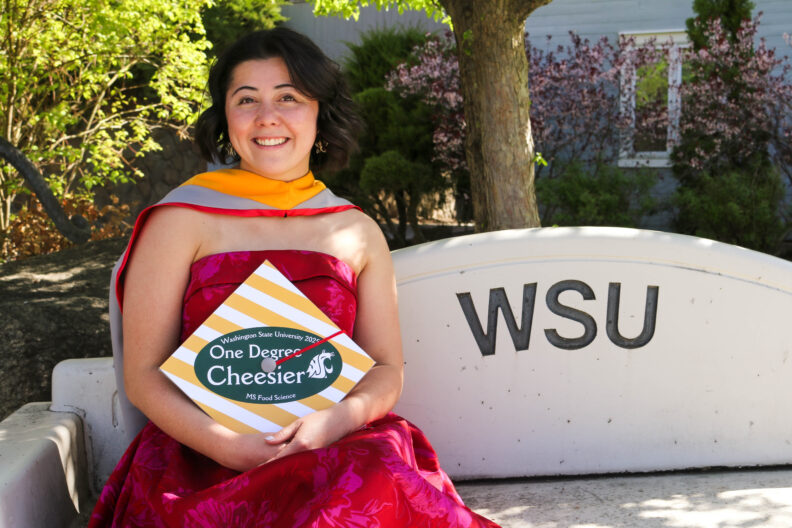
Can you tell me about your background both professionally and personally?
I grew up in Northern California and I went to a Montessori school, which is important to me because it shaped the foundation of where I went professionally. I went to a Montessori school from first through eighth grade, and that experience built a foundation for loving science. For high school, I went to a private school that really prioritized getting kids into college. My mom would talk through all these different potential career paths around this time, because we knew I liked science, but we didn’t know what I was going to do with it because I did not want to be a doctor. Then, she brought up food science and it [lit a spark].
For my undergrad, I went to Azusa Pacific University, which is a small Christian school in Southern California. I had the opportunity to study biochemistry and be part of their honors program. I did a honors humanities major as well as a biochemistry major, and then I ended up here in food science.
Throughout that whole journey, I have been very interested in food science. Instead of taking my bio chem classes and pretending that I was pre-med, I always told my professors, “This is what I’m interested in. How do I frame this course around what I’m interested in?”
What drove you towards sensory science in particular?
I always thought that the chemistry behind how we smell and taste was very interesting. In undergrad, we did a few journal club activities in a few classes. I found a journal that was on kokumi taste and cheddar cheese. [Kokumi is] another basic taste that they’re still researching. I remember looking into that paper and being like, “this is what I want to do.”
But I really liked linking to people’s perception and bringing what we do as scientists back to the people. That’s why I ended up in sensory science. I’m very people motivated, and people driven, so I feel like sensory is one of those places that you really get interaction from all levels.
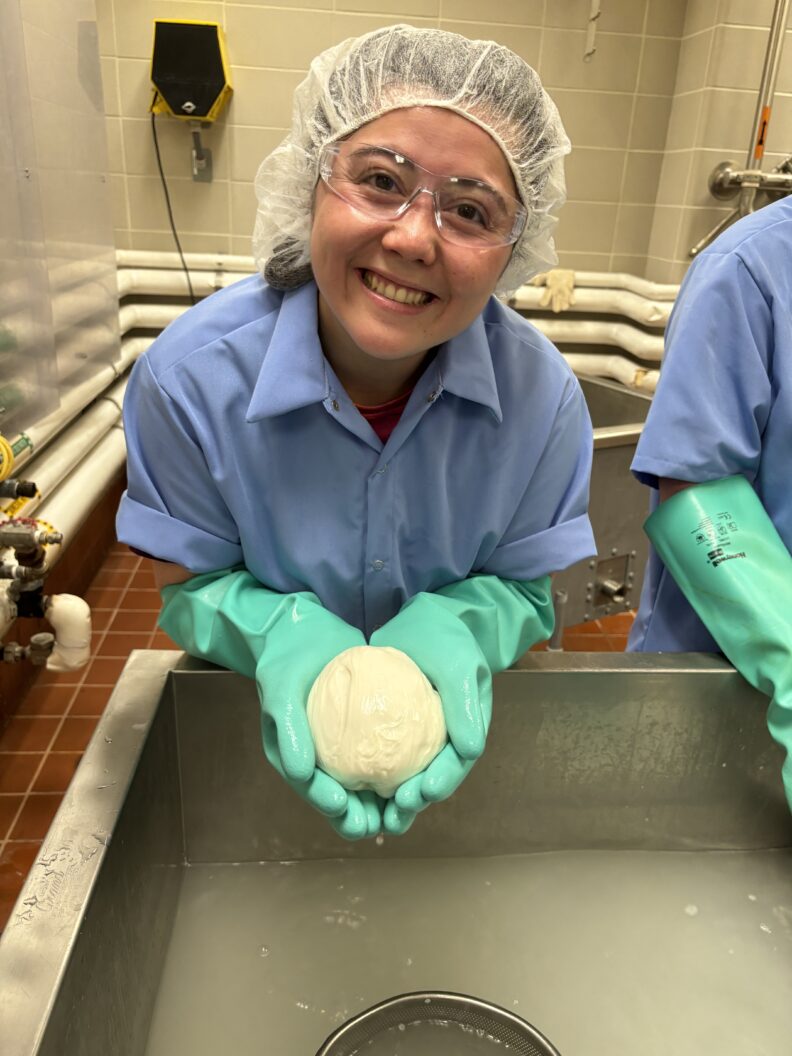
Has there been a general panelist perception during a particular panel that surprised you?
I didn’t know a ton about sensory coming into my masters, and I had never done a trained panel before, but being on all of the panels where we have to describe crispy versus crunchy has been really interesting, because that is an incredibly hard thing to quantify for people. Most of my work has been in trained panels. I’ve run my own trained panel and then I’ve assisted with multiple. Trained panels are completely different than consumer panels. You’re sitting down a group of 8 to 12 people, and we have to teach them how to evaluate. Crispy versus crunchy sometimes seems impossible to train in the short amount of time we have with them.
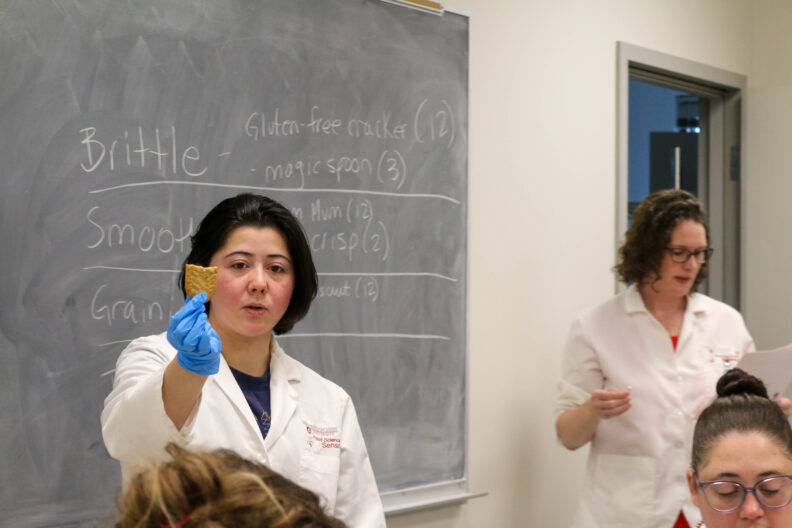
The difference is that crunchy is a low-pitched noise and cracks into fewer chunks, versus crispy, which is a high pitch noise and the food shatters into many pieces. It sounds really easy when you say it like that, but then they can also happen at the same time and so it’s a complex modality. It’s an interaction between you chewing and hearing that sound. The noises that the mouth makes when we’re chewing can be really hard to quantify.
Do you have a favorite sensory panel that you’ve either conducted or have supported in any way?
The weirdest one was dog food. We had to recruit people to sniff dog food.
The dogs weren’t involved?
Nope, the dogs were not involved in this one. We were evaluating what the people perceive from the dog food, because if you don’t like the smell of the dog food, you’re not going to feed that to your dog, right?
What’s something you’re proud of from your time here at WSU?
I’m very proud of how much I’ve grown and how much I’ve learned coming in. I had no clue what I was doing. My undergrad had no grad students, so I had never seen someone go through grad school before.
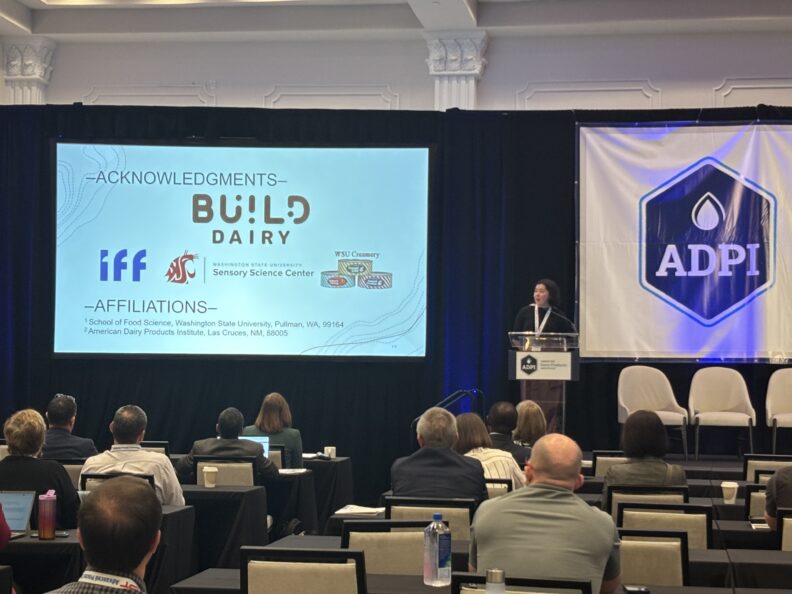
Earlier this year I went to American Dairy Products Institute’s Global Ingredients Summit. I was one of ten abstracts that was selected, and then I was chosen to give a presentation. I got third out of those three presentations, which is great. The other two were PhD students who had presented their work many, many times, so it was exciting for me to be chosen.
Do you have any advice for undergraduate students who are looking to pursue a graduate degree?
Don’t get too hung up on the research. Obviously, you want to be interested in it, but the person that you should be really prioritizing is the advisor. You should look for an advisor that you mesh with that has similar goals to you regarding your education. My advisor completely understood where I wanted to go. That being said, I didn’t really have much of a choice in my research project, and that might be where you’re at, and that’s fine for your masters. Don’t get hung up on finding the perfect project. What you can get hung up on is finding the perfect advisor.
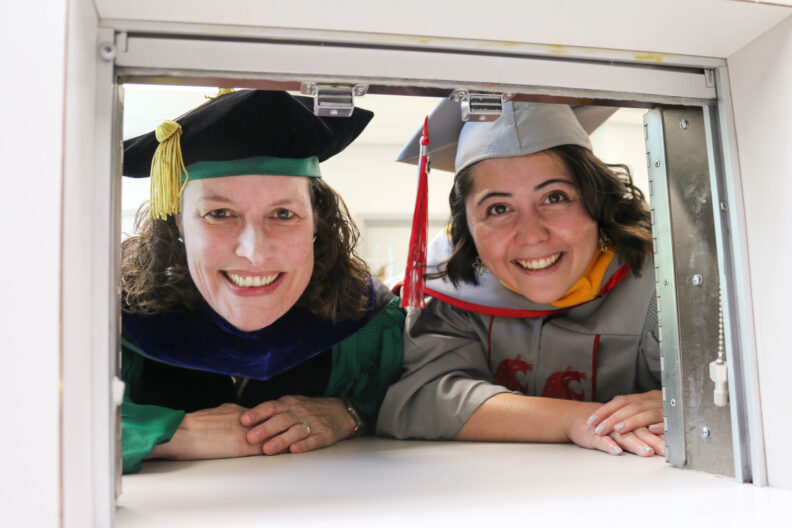
Also, networking is so important and it can get you to places that you otherwise wouldn’t. I think that’s the other big thing to prioritize. If you’re interested in going further than a masters, many professors who do offer PhD programs will be attending these conferences and events and connecting with them there can be a great foot in the door for you later.
Any parting words?
I think leadership is something that, if you’re interested in going in a similar path that I am, where I want to work and be able to talk to clients. I want to be able to take initiative and apply the knowledge that I’ve gained, and finding ways to get involved with leadership, not just in food science, but in any realm really, really helps.
I worked at a Girl Scout camp for six years as a counselor, three of those were spent directly working with kids, but then I had the opportunity to work as a program director. Instead of being responsible for children, I was responsible for a bunch of adult staff to get stuff done. I had to come up with skits, make all the costumes for said skits, run campfires, run bingo night… But it was a great leadership opportunity. It helped with my communication skills across all ages. With things like this, it may not seem that relevant on your resume at first, it’s still totally worthwhile to include it because it is valuable experience.
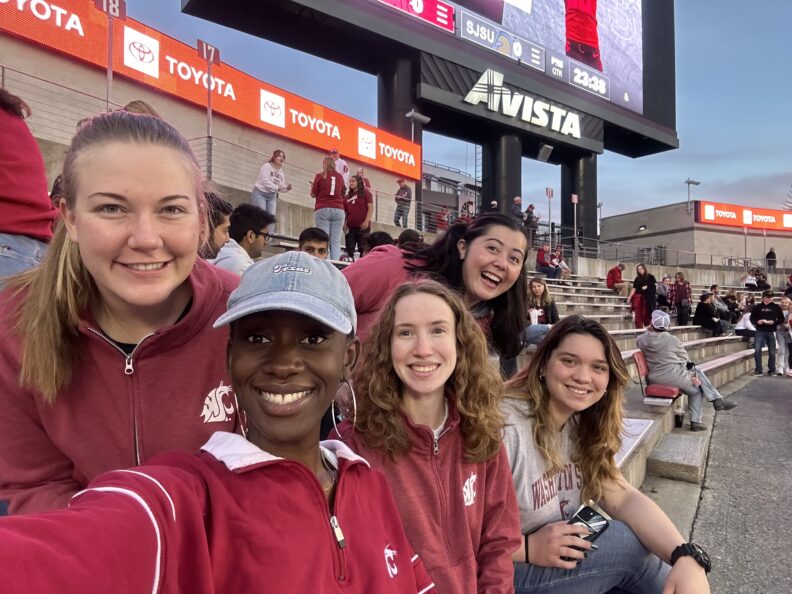
Also, find community. Don’t just hole yourself up into one space. Find places that you feel comfortable attending. You can join clubs as a grad student too, people don’t usually think of that.